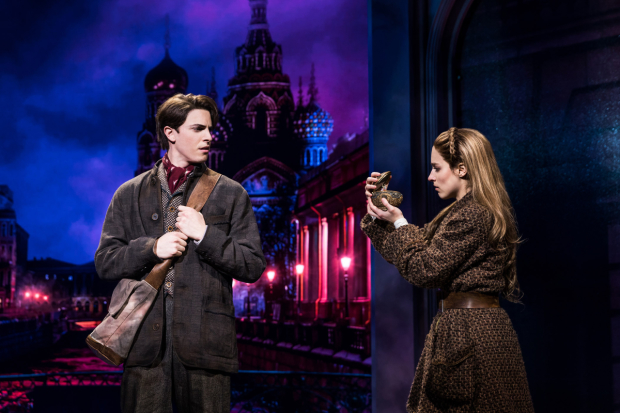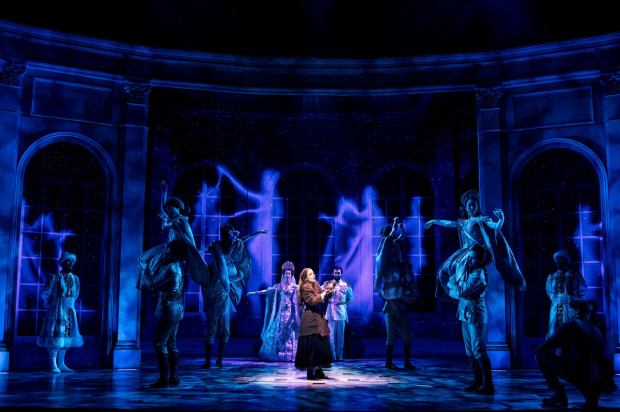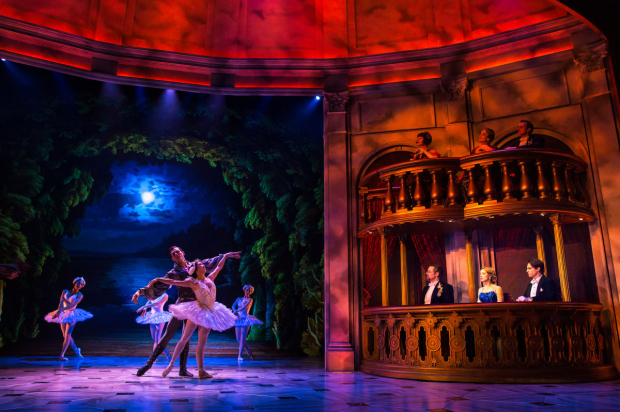Anastasia

(© Matthew Murphy)
The Grand Duchess Anastasia Nikolaevna was murdered, along with the rest of her immediate family, in the early hours of July 17, 1918. Extensive forensic and DNA analysis from two mass graves outside of Yekaterinburg should have been enough to end nearly a century of speculation that the tsar's youngest daughter escaped execution: All the Romanov bodies are accounted for. Still, generations of conspiracy theorists and fiction writers have been drawn to the glimmer of hope that maybe, just maybe…Anastasia survived. The latest addition to the ever-growing mythology around this historical dead teenager is the new Broadway musical, Anastasia, now entrancing audiences at the Broadhurst Theatre with its heady mixture of questionable history and schmaltz.
Songwriters Stephen Flaherty (music) and Lynn Ahrens (lyrics) have revamped and augmented their score from the 1997 animated feature by 20th Century Fox, which had every little girl and gay boy in America dreaming of life as a lost Russian princess. They have teamed up with book writer Terrence McNally (their collaborator on Ragtime) and director Darko Tresnjak to create a stage version of Anastasia that is undeniably entertaining, but also relevant to the magical thinking that seems to have overtaken so much of the world.

(© Matthew Murphy)
The musical begins just as the movie did: Young Anastasia (Nicole Scimeca) is the daughter of Tsar Nicholas II (Constantine Germanacos), the absolute ruler of all Russia. She is also the favorite granddaughter of the Dowager Empress (Mary Beth Peil), who promises to take her to Paris someday. But while Nana is away in France, the imperial family is killed in the Russian Revolution — at least so we think.
Rumors abound that Anastasia escaped the Bolshevik assassins and the Dowager Empress is offering a handsome sum to anyone who can bring her to Paris. Looking for a girl who could pass for Anastasia, con artists Dmitry (Derek Klena) and Vlad (John Bolton) see potential in Anya (Christy Altomare), an amnesiac street sweeper who can't remember her life before the revolution. They set out for Paris, determined to convince the old woman; they end up convincing themselves.

(© Matthew Murphy)
Notably absent from this version is any mention of the mystic Rasputin, the primary antagonist in the film (although portions of his song have been gorgeously repurposed into "Stay, I Pray You," a number about exile). McNally has replaced the undead magician with a far more realistic (and terrifying) villain in Communist official Gleb Vaganov (Ramin Karimloo), who chases Anya across Europe on a mission to stop this royal pretender. Torn between his ideology and his compassion, Karimloo lends humanity to a role could easily devolve into a cartoon commie.
There are plenty of great performances in Anastasia: Peil brings an icy skepticism to the Dowager Empress, making her eventual conversion all the more satisfying. Caroline O'Connor is quite funny as the languidly nostalgic Countess Lily. Klena is charming as Dmitry, wowing us with his powerhouse vocals on "My Petersburg," an instant classic of the Ahrens and Flaherty songbook.
Sporting a bright and clear voice, Altomare is amiable as Anya, but not nearly enough of a presence to sustain this central role. She has the unenviable task of closing the first act by herself (a feat only ever attempted by the most seasoned Broadway divas) with "Journey to the Past," the most memorable song from the film. When it's just Altomare and the audience, her weaknesses become clearer, revealing every obvious choice and forced facial expression meant to telegraph hope. She wraps it up with big arms that reveal the City of Light bursting through a thicket of cherry blossoms.
That somewhat ludicrous visual is courtesy of Aaron Rhyne's projections, which range from impressive to cheesy. His animated snow all too often makes the mise-en-scène resemble a computer screen-saver. Still, his full house projections depicting the spirits of dancing courtiers during "Once Upon a December" are quite beautiful and will send chills down your spine.

(© Matthew Murphy)
Director Darko Tresnjak leans heavily on Rhyne's projections to fill out his staging, which takes place on Alexander Dodge's three-turntable set. Actors rotate on and off like figurines in a life-size music box. The stage picture is made even more breathtaking by Linda Cho's richly detailed costumes. Peggy Hickey choreographs a striking second act ballet in which portions of Swan Lake mirror the lyrics being sung by our main characters. In moments like these (and there are several), Anastasia seems to transcend its cartoonish origins and become something one might not expect from the title: a serious Broadway musical.
That also comes from McNally's book, which flirts with our sense of wonder while regularly yanking us back down to earth. "If I were the Dowager Empress, I would want you to be Anastasia," Dmitri tells our heroine, and we completely sympathize because we want to believe too: It’s just a much better story than the awful truth that the real Anastasia never lived to see her 18th birthday.
Anastasia is powered by the friction between reality and desire, when wanting to believe in something so badly causes us to doubt our own senses (the significance of this story taking place in Russia should be lost on no one). In an age in which fact, history, and truth faces mounting doubt, Anastasia makes an appealing case for the seductive power of unreason.











